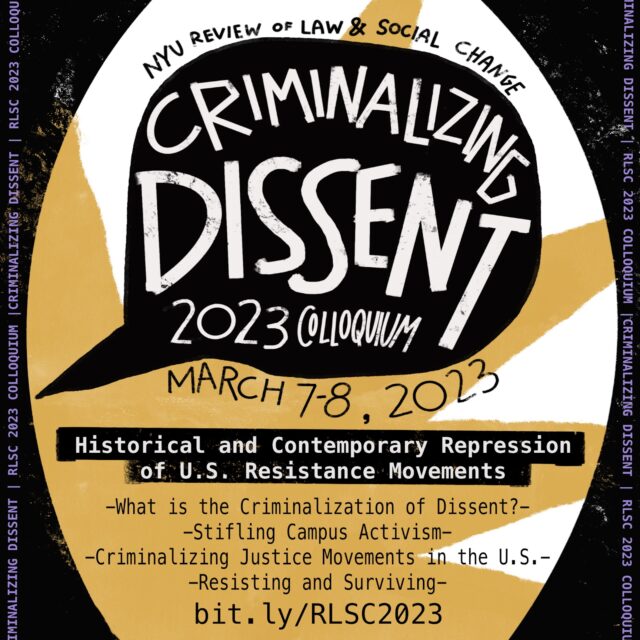2023 Colloquium Announcement: Criminalization of Dissent

We are thrilled to announce the 2023 Review of Law and Social Change Colloquium – Criminalization of Dissent: Historical and Contemporary Repression of U.S. Resistance Movements that will be held on March 7th and 8th via Zoom. The Colloquium will bring together organizers, legal practitioners, and activist scholars to learn more about the ways in which the state and institutions are suppressing radical justice movements, this repression’s impacts on our own communities and communities across the globe, and the ways in which they can fight back against efforts to stifle the right to dissent. This is an opportunity to hear from people on the ground, better understand the through-lines of suppression of dissent in the U.S., and chart a way forward together.
Please find an overview of the four panels below. The entire event will be held over Zoom remotely and is open to the public. More information on the event is available here.
Closed captioning as well as ASL and Spanish interpretation will be available.
This event was planned in collaboration with BALSA, the Center on Race and Inequality, CoLR, DALSA, Immigrant Rights Project, LSJP, NLG, OUTLaw, SALSA, SRP and WoCC, and with the support of more than 20 co-sponsoring student organizations. Thank you to all of our supporters!
Panel Overviews
Day 1 – March 7th, 2023
Panel 1 | 4:30 – 6:00 PM EST
What is the Criminalization of Dissent? – Discuss the theoretical concept and history of criminalizing dissent and the ways in which U.S. law and culture represses resistance. This panel will examine historical examples of suppression of activism related to U.S. foreign and domestic policy, international liberation movements, and community organizing.
Panel 2 | 6:30 – 8:00 PM EST
Stifling Campus Activism – Discuss the ways in which higher education stifles and monitors student activism. Panelists will discuss the ways in which both higher education curriculums, incentive structures, and requirements make activism more difficult on campus and pull students away from organizing outside of campus. This panel will discuss the ways in which students and others in academia can remain committed to social causes and how the legal profession can evolve to more directly serve to advance justice.
Day 2 – March 8th, 2023
Panel 3 | 4:30 – 6:00 PM EST
Criminalizing Justice Movements in the U.S. – Discuss the recent history of criminalization and the role of police in suppressing, terrorizing, and fracturing racial and climate justice movements. This panel will discuss police and legislative responses to the Ferguson Uprising, protests in the wake of police murders of Mike Brown, Eric Garner, Breonna Taylor, and George Floyd, the Standing Rock and Line 3 protests, and the ongoing #StopCopCity actions. This panel will explore the efforts to deter and fracture justice actions, the experiences of those who have been targeted by the state, and the central role state violence plays in suppressing dissent.
Panel 4 | 6:30 – 8:00 PM EST
Resisting and Surviving – We will discuss how criminalization of dissent impacts the lives of organizers in the wake of a justice uprising, how it impacts organizers working under the threat of criminalization, and what resources exist to support those who have been targeted because of their justice work. We will also hear from lawyers about legal avenues and litigation tactics to resist these attacks.